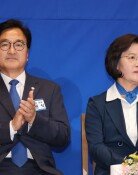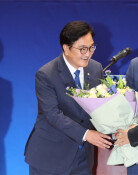Companies complain about won`s wild rollercoaster ride
Companies complain about won`s wild rollercoaster ride
Posted October. 30, 2011 05:21,
A petrochemical company based in the Daesan Petrochemical Complex in Seosan, South Chungcheong Province, has changed its forecast for the won-dollar exchange rate for next year twice over the past three months.
In early September, the company forecast 1,050 won to the greenback, but raised it to 1,100 after the onset of the European fiscal crisis at the end of the month. When the won`s value began rising, however, it revised its forecast again.
The company processes crude oil by importing. Its chief financial officer said, "If the won-dollar exchange rate moves 1 point, net profits fall or rise 1.2 billion won (1.09 million U.S. dollars)," adding, "With the exchange rate moving like a ruby ball whose direction cannot be predicted, we are having a hard time devising next year`s business plan."
As such, the won-dollar rate is on a rollercoaster ride. Due to the European fiscal crisis, the rate hit 1,194 early this month but rose to 1,104.9 on Friday, including 1,094 in the morning.
Byeon Ji-yeong, a researcher at Woori Futures Research Institute, said, "With the crisis in the euro zone eased to an extent due to the EU summit and the U.S. showing favorable economic indicators, the won gained significantly," adding, "Demand for settlements will slow the pace of the won`s rise, but the won-dollar exchange rate is likely to fall below 1,100 points over the long term."
As recently as August, experts said the exchange rate would fall below 1,000, but with the won repeating its rollercoaster ride, many Korean companies have struggled to manage the fluctuations.
When the European fiscal crisis worsened early last month, the won fell 15 to 30 points each day, but has gained more than 10 points per day since the middle of October.
Generally, a weak won increases exports and a strong won increases imports. Severe volatility renders this analysis useless, however. This is why the Strategy and Finance Ministry warns that rapid moves toward one direction can arouse market jitters whenever the won wildly fluctuates.
To prevent a rollercoaster ride for the won, the government has implemented three regulations: limits on forward exchange position, a new "burden charge" for foreign currency soundness and taxes on foreigners who invest in bonds, and currency swap contracts with China and Japan. Those measures will serve as a last resort, however, instead of preventing the won from fluctuating.
Experts say the government needs to take preemptive measures because the exchange rate can rapidly change at any time due to external factors though the won has continuously gained.
Jeong Yeong-shik, a senior researcher at Samsung Economics Research Institute, said, "Companies need to share their expertise on FX risk management with their partner companies and make every effort to identify the fiscal soundness of financial institutions and large-scale customers," adding, "They have to consider the risk of unit cost change stemming from exchange rate fluctuations, a constant for business planning."
january@donga.com







